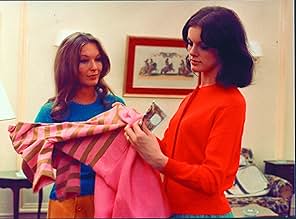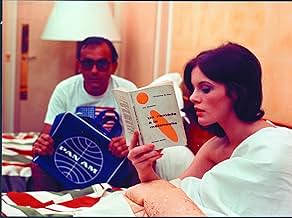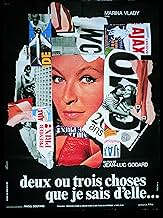2 ou 3 choses que je sais d'elle
- 1967
- Tous publics
- 1h 27min
Une journée dans la vie d'une femme au foyer et prostituée parisienne, entrecoupée de réflexions sur la guerre du Vietnam et d'autres problèmes contemporains.Une journée dans la vie d'une femme au foyer et prostituée parisienne, entrecoupée de réflexions sur la guerre du Vietnam et d'autres problèmes contemporains.Une journée dans la vie d'une femme au foyer et prostituée parisienne, entrecoupée de réflexions sur la guerre du Vietnam et d'autres problèmes contemporains.
- Réalisation
- Scénario
- Casting principal
- Récompenses
- 1 nomination au total
- Narrator
- (voix)
- Young Man
- (non crédité)
- Girl Talking to Robert
- (non crédité)
- Girl in Bath
- (non crédité)
- Christophe Jeanson
- (non crédité)
- Meter Reader
- (non crédité)
- Marianne
- (non crédité)
- Monsieur Gehrard
- (non crédité)
- Girl
- (non crédité)
- Man in Basement
- (non crédité)
- Author
- (non crédité)
- Pécuchet
- (non crédité)
- John Bogus
- (non crédité)
- Woman in Basement
- (non crédité)
- Bouvard
- (non crédité)
- Robert Jeanson
- (non crédité)
- Roger
- (non crédité)
Avis à la une
However, "narrative" or gender politics are really not the point of "2 or 3 Things...". First off, "her" is less a person, but a city- Paris. And it is just not Paris, as in the city of romance and art, but De gaulle's radical transformation of Paris from a pre-war city of antiquity to a modern commercial center. The film is framed around extended shots of constructions sites, developing freeways, and cranes for a reason- to show how this ancient city is being radically transformed with or without the benefit of its citizens. In a way, this film is a meditation on a phenomena spreading around the world from the 1990's to the present (and especially the United States)- urban gentrification. In the push to modernize and beautify a city, the powers that be often step on the majority which make up a city- the lower and middle class. Godard's precise comments on urban planning are 40 years ahead of their time. If anything, "2 or 3 Things..." is far more relevant today than in 1967.
Secondly, the film is an agit-prop protest against crass commercialism and how it defaces and devoids the human experience. The 2 or 3 women in the film (Paris included) are so wrapped up in the base drive for material goods that they forget the very principles of humanity- love, caring for one's family, intellectual desire, and compassion. Godard's definition of consumerism robs a society of its metaphysical compassion and leads intellectual and personal freedom into a locked room. In the age of I-Pods and Paris Hilton, Godard's sharp criticism of crass consumerism is amazingly relevant. It is a wonder that the Adbusters/Culture jam movement have not latched onto this film with a passion.
"2 or 3 Things..." also serves as one of the many watermarks of Godard's highly productive and influential 1960's period- blending the emotions of Contempt or Vivre Sa Vie with the chic radicalism of La Chinoise or Week End. Godard was an artist in constant evolution in the 1960's and "2 or 3 Things..." is one of these many evolutionary steps.
Be forewarned, "2 or 3 Things..." is NOT a good starting point for those new to Godard. It is far too meditative, "slow", and didactic for one to get a true sense of Godard's radical style. I strongly recommend Masculine-Feminine, Contempt, Breathless, Band of Outsiders, or Week End as a better starting point for Godard. A newcomer to Godard's style might be forever turned off by the slow pacing of "2 or 3 Things...". However, after digesting a few of this great film maker's works, line up "2 or 3 Things...". A timeless and extremely relevant film.
Non-sequiturial loose-ends of non-communication between the characters, and conversations between the actors and the director which we are not allowed to follow.
Uncommunicative and unengaged philosophico-political maunderings of citizens who are floundering conceptually in a system that cannot sustain them, either morally or intellectually.
A view of Parisian building-sites as a social upheaval which yet represents the antithesis of any structural or constructivist manifestation of social progress.
A film that is, like the capitalist society that has the eye of the camera hypnotised, a profoundly blank and alienating surface, whose technique is only occasionally relieved by gratuitous scenes of meaning:
E.g. -
A woman trapped in a sink estate and yearning to be free, who is compelled by the desparation of her dream to entrap and enslave herself even further through prostitution;
The intrusion of a pimp-like meter-reader into the pure nakedness of private space;
A creche in a brothel;
A secular catechesis - The simple, non-sexual, non-manipulative dialectic of honest exploration that makes us human;
The still-birth of revolutionary thought as the spiral galaxy in a coffee-cup ...
All-in-all, the representation of a society which is profoundly inhospitable to the human beings who should constitute it, and which consequently does not permit the realisation of any aspect of humanity.
All we get are fugitive glimpses of life in the process of moral and intellectual decay. Thought and character remains unrealised, and the film is therefore also inchoate as the necessary reflection of this social unreality.
Here is a wan world, haemmoraging meaning as we watch. Here before us are the helpless ghosts of an industrial medium. They dance fitfully in the unchanging wind, the fantastic commercial simulacra in which we bind our free nature.
Strips of film, strung out like human fly-paper, where fluttering images stick only as they die. In place of creative pressure, an air of ennui, of carelessness: A drop-out film - a film of drop-outs, plot-holes in the threadbare social fabric, - neglectful of all appearances. The face of the film gazes basilisk-like out upon the viewer, resentful of our settled habits of non-involvement. Two frozen gazes cancel, the mutual incomprehension only verging on hostile irritation. No reaction. No drama. The light dies.
The hypnotic mirror of reproach whose conscience we yearn to assuage, that traps our humanity in the voyeur's dream, as it is projected back upon us in the Gorgon's gaze.
Desire is petrified - one's petty film-going expectations of this penetration of dark places disappointed. One escapes from the deathly spell of cinema into the real world.
Godard's lesson is that there is nothing meaningful in this cave of artificial shadows, and that he will bitterly wean us from our facile consumerist dreams, that we may the better engage with the harsh political realities of life.
The radically disillusioned auteur deconstructs himself. Le derniere vague flops exhausted on that endless strip where empty sprocket-holes run on aimlessly towards a dying sun.
The mechanism of dreams runs down.
We are not automata - we are made up by life. To live is the story we enact, without intermediary, and unmediated. The immediate and the authentic are alien to art. Art is a whispering empty shell left high and dry. Life is not the element of dead things: Do not listen to the shallow siren voice of le faux vague! Plunge back into humanity's proper medium.
Thus does a revolution in seeing strip out the gelatinous scales of our burned-out eyes, and there is no more interference with the wavelengths of light being broadcast from the nearest star.
Thus do the sighing bones of life articulate the bounds of existence.
We are the tides that wax and wane - the ocean that overwhelms itself, drowning its own waves in one flood of being.
Godard's film and films are under the influence of this larger movement. With his work, we are cast adrift from all anchors and familiar landmarks. We are 'all at sea'. There is a transition - a movement that is perhaps nearer to momentum than inertia - from whence we cannot recall to whither we cannot see. His is the ultimate cinema of flux.
I'm not a fan of the New Wave -- Truffaut, Demy, Malle and Rohmer occasionally excepted -- but this soon reveals itself as an exercise in the failings of modern society and the people within it. Everyone is disconnected from other human beings, everyone feels hopeless and is just going through the motions and no one tries to view anything as a more than a collection of unrelated attributes. It is possible, of course, that Godard has produced a satire of current French philosophy, with everyone well-dressed in the latest fashions, smoking American cigarettes and drinking Coca-Cola, and Raoul Levy showing up as "John Bogus, the American", wearing a t-shirt with an American flag and claiming to be a photo-journalist.
I do have an urge to smack every cast member, and that is why I think it may be a satire about hyper-intellectuals who are so wise they are miserable, so assured in their beliefs that they believe nothing, so brave in their solitude that they refuse to trust anyone.
But I think not.
Le saviez-vous
- AnecdotesWhen Juliette drops off her daughter at the day care/brothel, there is a painting on the wall of a screen shot of Nana Kleinfrankenheim, portrayed by Anna Karina, in Vivre sa vie: Film en douze tableaux (1962).
- Citations
Narrator: Since social relations are always ambiguous, since my thoughts divide as much as unite, and my words unite by what they express and isolate by what they omit, since a wide gulf separates my subjective certainty of myself from the objective truth others have of me, since I constantly end up guilty, even though I feel innocent, since every event changes my daily life, since I always fail to communicate, to understand, to love and be loved, and every failure deepens my solitude, since - since - since I cannot escape the objectivity crushing me nor the subjectivity expelling me, since I cannot rise to a state of being nor collapse into nothingness - I have to listen, more than ever I have to look around me at the world, my fellow creature, my brother.
- ConnexionsEdited into Notes pour Debussy - Lettre ouverte à Jean-Luc Godard (1988)
Meilleurs choix
Détails
- Date de sortie
- Pays d’origine
- Langues
- Aussi connu sous le nom de
- Deux ou trois choses que je sais d'elle
- Lieux de tournage
- Sociétés de production
- Voir plus de crédits d'entreprise sur IMDbPro
Box-office
- Montant brut aux États-Unis et au Canada
- 104 038 $US
- Week-end de sortie aux États-Unis et au Canada
- 11 214 $US
- 19 nov. 2006
- Montant brut mondial
- 104 038 $US
- Durée
- 1h 27min(87 min)
- Mixage
- Rapport de forme
- 2.35 : 1



























